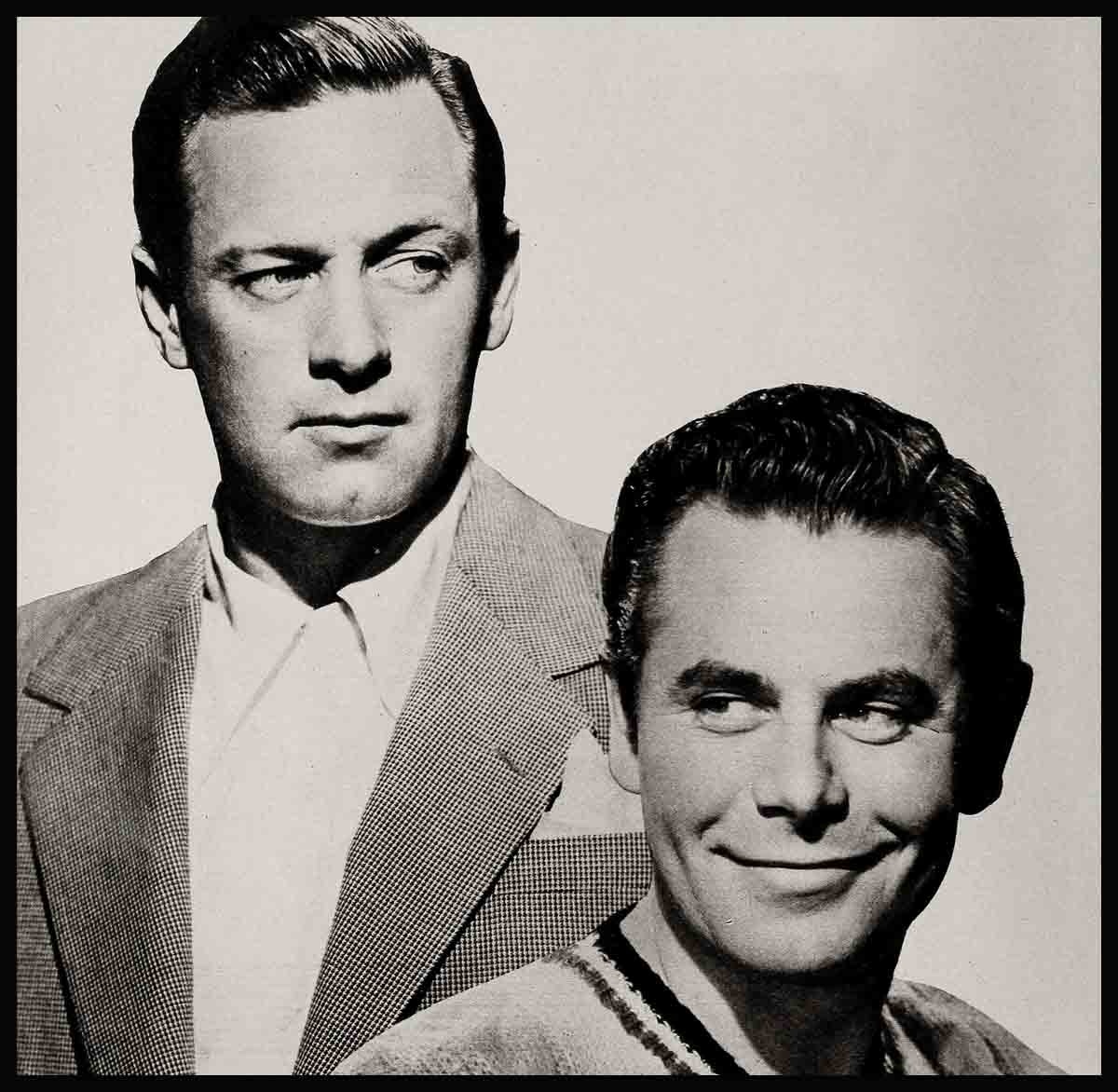
Anything You Can Do, I Can Do Better—Glenn Ford & William Holden
One morning recently Bill Holden got up from his breakfast table and casually said to his wife:
“Honey, I’m going to run into town for about an hour or so.”
“Whatever for?” asked Brenda. “I thought you were going to loaf around the yard today.”
“I just want to pick up a couple of things at the store,” Bill said. “I won’t be long.” And he reached over and kissed her and was gone.
Brenda leaned over and took a look at the newspaper Bill had been reading while he ate. Then she picked it up and walked into the kitchen. The housekeeper was washing the dishes.
“You want to make me a little bet?” Brenda asked.
“What’s that?” asked the housekeeper.
“I will bet,” said Brenda, stabbing at a picture in the paper, “that Mr. Holden comes back here in an hour with some of those Slim Jim narrow neckties the men ate beginning to wear.”
The housekeeper looked at the picture. It was a shot of Glenn Ford getting off a plane, back from Europe. The camera appeared to have been focused on a fancy Slim Jim tie Glenn was wearing.
“You just wait and see,” said Brenda.
An hour later Bill walked into the house and announced with a cheery yell that he was back. Brenda came to greet him.
“What have you got in the package there?” she asked.
“Oh,” said Bill, “I just happened to pass a haberdashery and I saw some of those narrow neckties in the window, so I bought a few. I think I’ll begin wearing them.”
“That figures,” said Brenda.
“What?” asked Bill.
“Nothing,” said Brenda. “What do you want for lunch?”
It has always been that way, ever since Bill Holden and Glenn Ford have known each other. All Hollywood knows it, but neither Bill nor Glenn will admit it. Whatever one does—the other will do, and try to do it better. Whatever fad one starts, the other will pick it up—and claim he originated it. If Glenn Ford took up croquet tomorrow morning, Bill Holden would have a mallet in his hand by nightfall. It is a friendly contest that includes all endeavor, but it is a real and earnest contest.
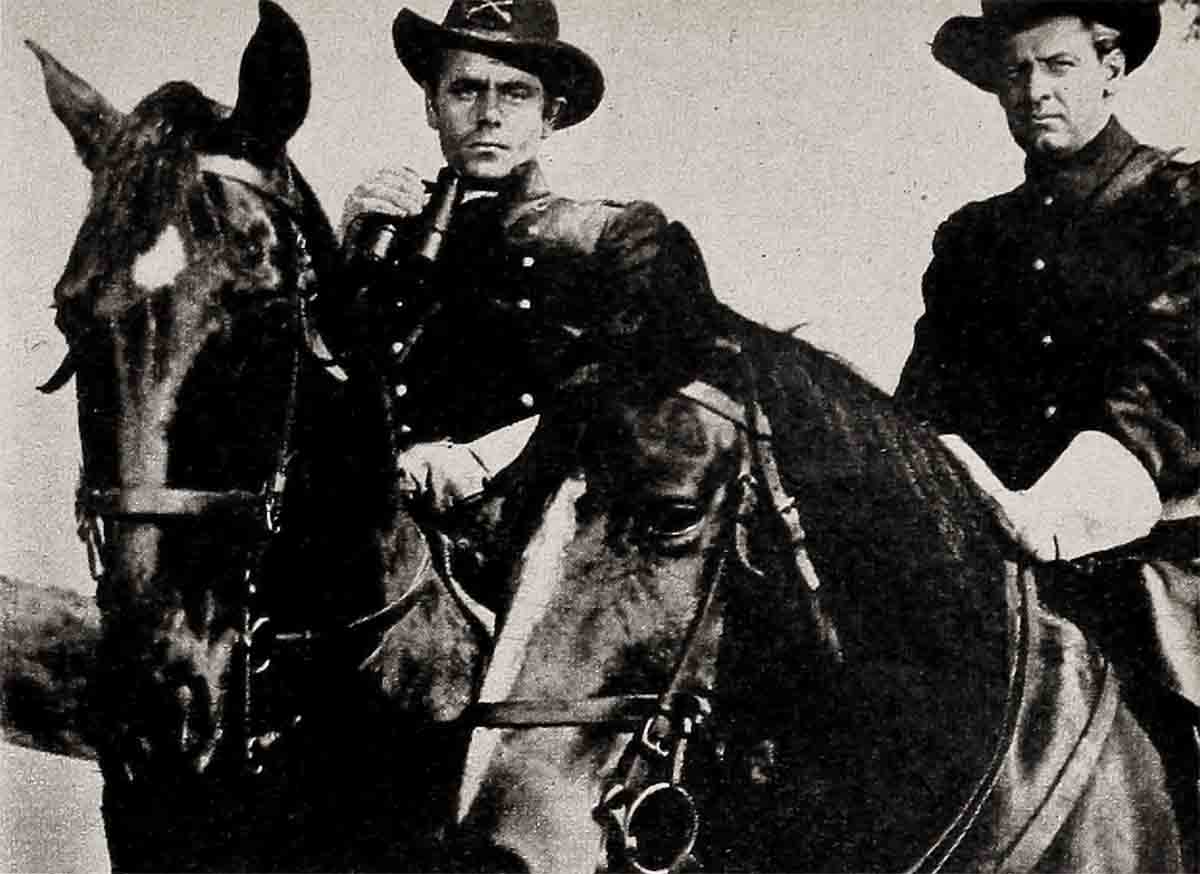
It wasn’t too friendly at the beginning, though. That was before the war. Bill Holden, a youngster from Pasadena, had skipped into the movies through the back door. Columbia Studio had been searching for a Golden Boy, to play the title role in a picture of that name. The director wanted an unknown and the search for a lad with the physique of a prizefighter and the sensitive face of a violin prodigy had covered the country. Then someone brought in Bill Holden from Pasadena—and overnight he was a star.
Columbia, in those days, was not too well populated with stars and before long, Bill, although not in the big money, was one of the top personalities on the lot and was being assigned the choice young leading man roles.
The way those who remember tell it, Bill began noticing a tall, good-looking young fellow earnestly trotting about the studio grounds almost every day. He was quiet, self-effacing and kept strictly to himself. Bill was a mixer and the silent fellow bothered him. One day he decided to find out who the man was. During lunch he turned to an associate producer sitting next to him. He pointed out the stranger across the room.
“Say,” he said, “who is that fellow?”
“His name’s Glenn Ford,” said the producer.
“What’s he doing here?” Bill asked. “Every time I turn around I see him. Almost like he’s following me.”
“Maybe he is,” said the producer. “He’s an actor—and the company hired him to replace you, anytime you can’t make a part or kick up your heels.”
“To replace me?” howled Holden. “Why, the scavenger! He’s like a ghoul!”
For the next few months Glenn Ford paid little attention to anyone he didn’t have to do business with. He made pictures, some of them that Bill Holden thought he might have played if Glenn hadn’t been around. There were B pictures, but some good ones. A Blondie, a thing called Babies For Sale and, finally, a good one, So Ends Our Night, with Fredric March and Margaret Sullavan. Holden watched the young man’s career with extreme anxiety.
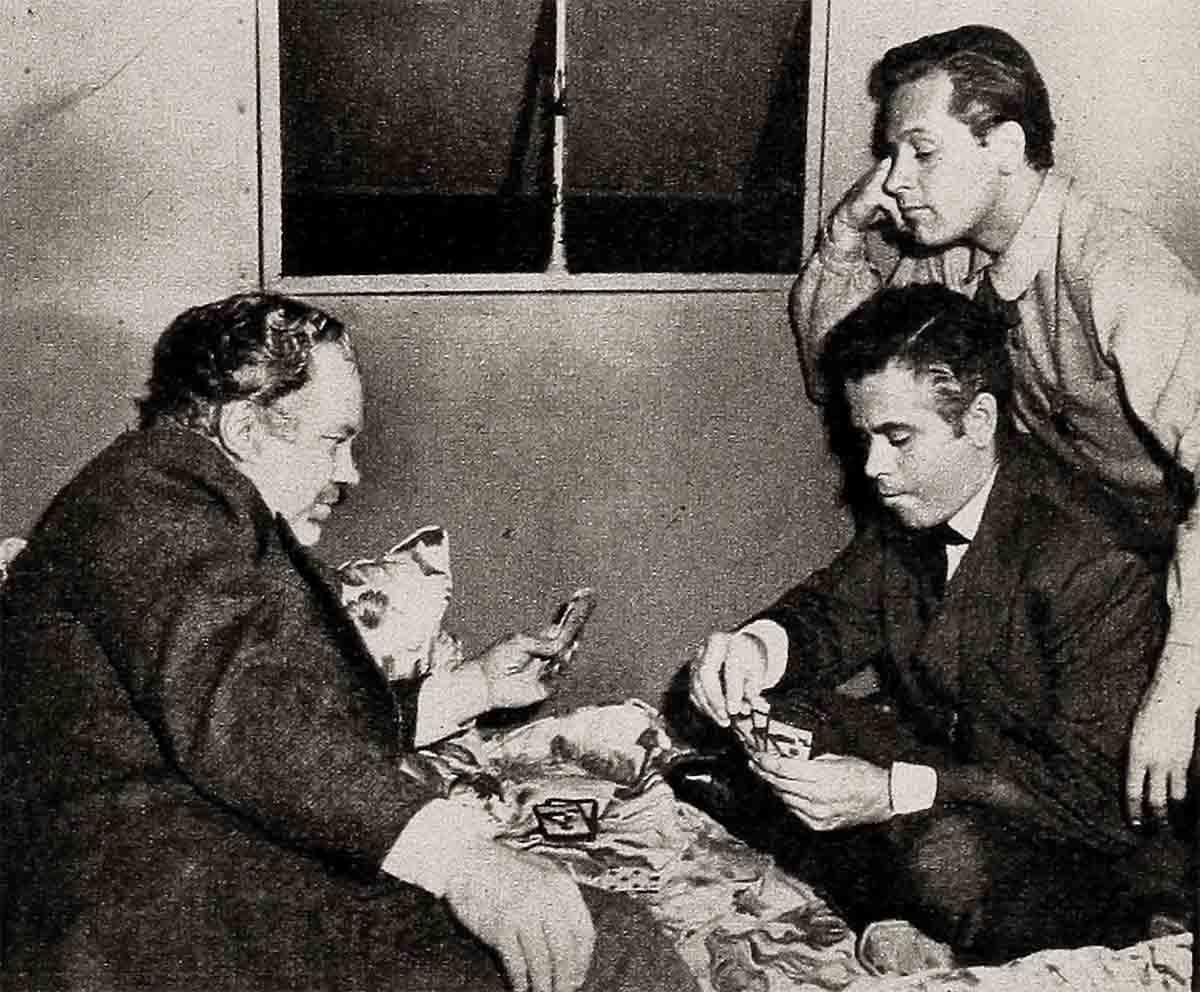
One day Holden was called into the front office.
“We have a fine script for you, Bill,” he was told. “A real great outdoors yarn called Texas.”
“Good,” said Bill. “What’s the story?”
“Well, there are two young fellows,” said the executive, “who are after the same girl, and . . .”
“Who’s the other young fellow?” Bill interrupted.
“He’s right outside in the other office,” said the executive. “Like you to meet him.” He pushed a buzzer and Glenn Ford—the other young fellow—walked in.
There was a handshake, quiet “Gladtameecha’s” and Bill Holden and Glenn Ford became friendly, but eternal enemies.
During the shooting of Texas, the entire production company was in a panic. If a scene called for Glenn to ride up to a hitching post, dismount and walk through a saloon door, Glenn would arrive at the post like a jet plane, leap off the horse and land ten feet away and charge through the door without bothering to open it—while Bill sweated on the sidelines and muttered “Ham!” And if Bill was supposed to stage a quiet battle with two or three of a room full of stunt men, he would ignore his instructions and, quickly polishing off his assigned targets, would wade into everyone else in the room. There were some who thought they’d never live through the picture.
But something more than the birth of a rivalry started during the shooting of Texas. Bill Holden and Glenn Ford slowly developed a profound respect for one another, and by the time the film was completed they were fast friends. From that day to this they will try to top each other in anything, but one will not stand by and listen to a word spoken against the other.
The war interrupted their competition for awhile. Bill went into the Army and a few days later Glenn dropped by the studio to announce that he had enlisted as a private in the Marine Corps. It has to be admitted that Bill got the rank. He became a Lieutenant, while Glenn remained an enlisted man, but Glenn was always quick to explain that any enlisted man in the Marines was better than any two officers in any other branch of the service.
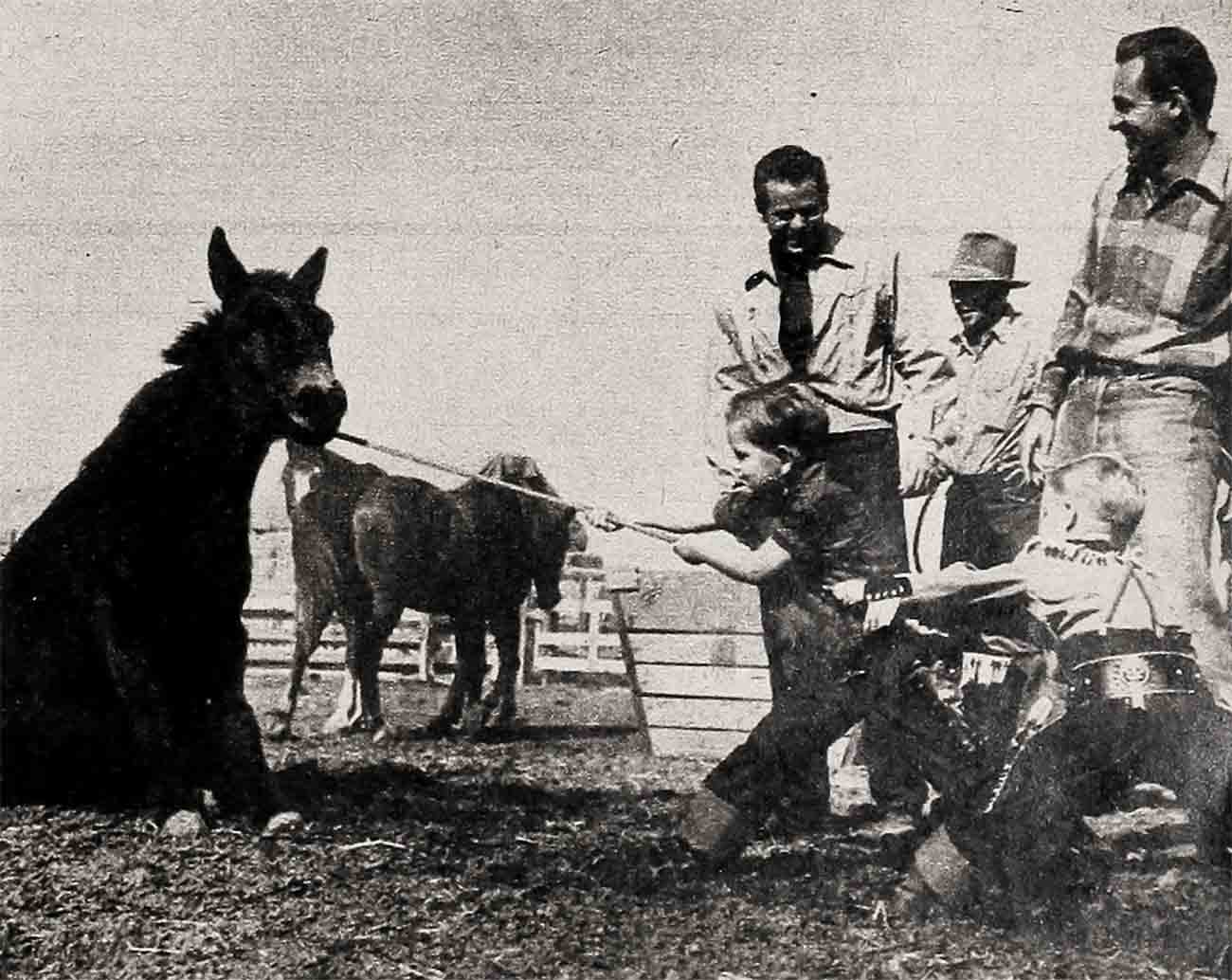
Back in civies, Bill and Glenn were immediately thrown back into their old competitive life. Again they were informed by Columbia that they were to be co-starred in a Western called The Man From Colorado. They appeared together in the office of Harry Cohn, Columbia’s head man, for a script reading. When it was over, the boss asked them what they thought. The boys agreed it was fine. Mr. Cohn asked them which roles they thought they were best suited for. Bill looked at Glenn and grinned.
“I’ll tell you what, Harry,” he said. “I’ll flip Ford to see who plays what.”
And, although it is probably the only time in the history of pictures that casting has been handled that way, that is how the roles were handed out.
A few weeks before The Man From Colorado was due to start, Holden dropped into the office of a friend at Paramount and with a sly grin confided that he was about to show Ford up but good.
“The guy is out of condition,” Bill said gleefully. “He’s as soft as mush. I just signed up with a gym in the valley and I’m getting out every morning at five for a couple of hours ride. When the picture starts, I’ll make him look like a bum.”
Two weeks later he dropped by the same man’s office, this time in a rage.
“Do you know what I just found out about that dirty rat Ford?” he cried. “He’s been riding every day and working out with bar bells. He’s figuring on making me look like a jerk in the picture.”
When the picture started, it was a thing to behold—the two muscle men vying with one another to break their own necks. In a burst of enthusiasm, during a fight scene one day, Glenn picked a 180-pound stunt man right off his feet and flung him across a bar at a bunch of extras. Holden was goggle-eyed and mortified that he hadn’t thought of it first.
It might be well to state here that neither Glenn nor Bill are what you would call actorish actors. They are not the least bit hammy, are both substantial family men, serious citizens and active in Hollywood community life. They have the usual number of rabid fans, but serious students of good acting are also among the active members of their fan clubs. Looking over the list you will find a good many celebrities, from Mickey Rooney and Joan Crawford to Thomas Mitchell and Jean Gabin. Their jousting, then, is not at all an expression of professional jealousy, but a running gag that has lasted and taken on a serious note.
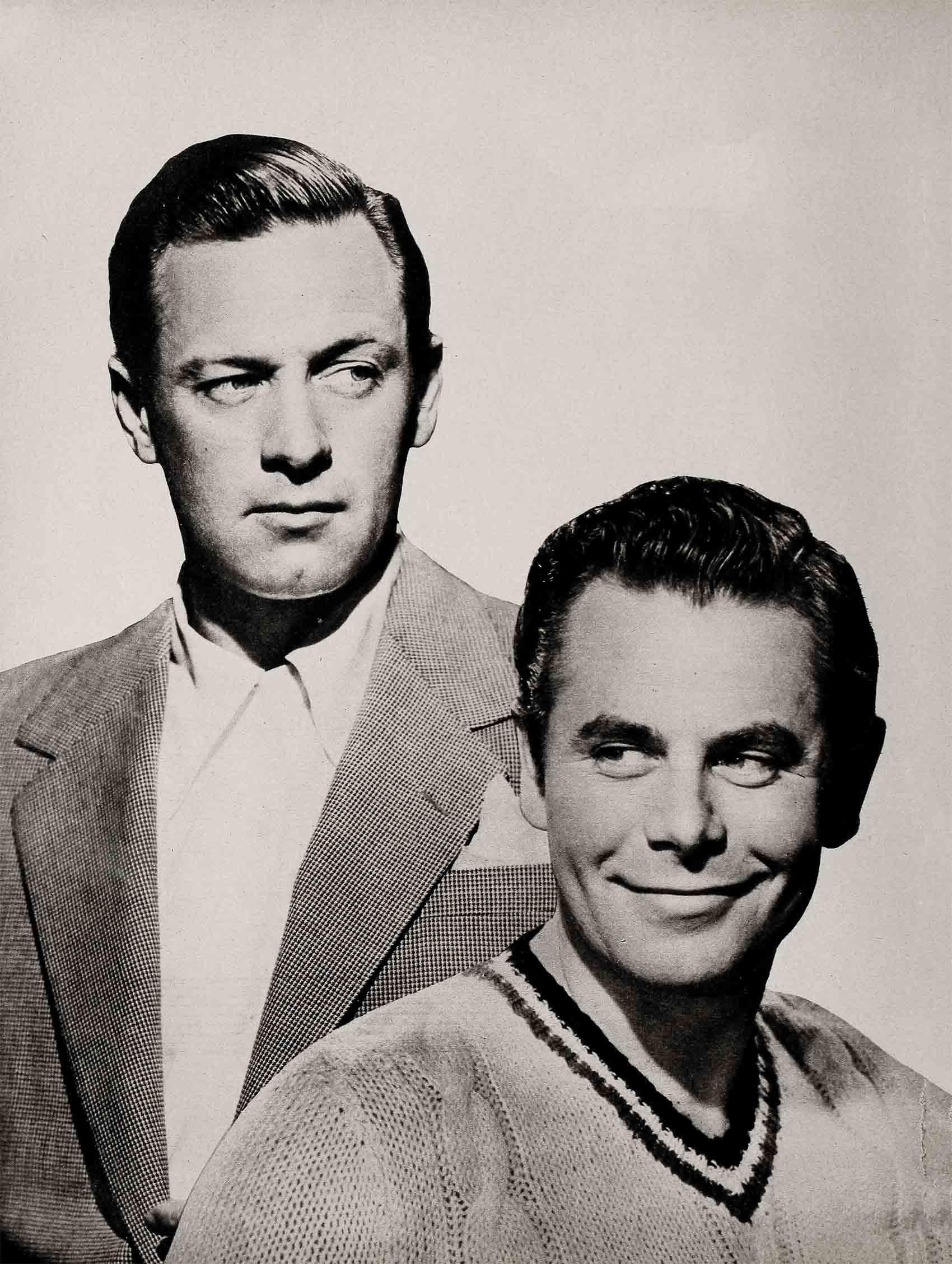
Glenn Ford would rather swindle Bill Holden out of a dime than find a hundred dollars. He once let Bill sell him an old saddle, properly reluctant to buy, of course, for $25. Bill could hardly wait until he got home to tell Brenda how he had clipped Glenn on the saddle sale.
“And so,” he wound up his tale all out of breath, “I dumped the thing in the back of his car and made him give me this check for it—so he couldn’t change his mind.”
He showed the check proudly. Brenda’s face fell.
“You’re probably going to want a divorce,” she said.
“What for?” asked Bill.
Brenda took him out to the garage where the saddle was perched atop a saw horse. Bill’s eyes bugged.
“You didn’t let him return it, did you?” he howled.
“No,” said Brenda sadly. “He came by a while ago and I bought it from him for you. For $35—and I gave him cash.”
The arrogance of the two men becomes so intense at times it almost seems idiotic. They were talking about their kids one day when Glenn casually remarked that his son was three years old.
“No he’s not,” said Bill, “he’s four.”
“I guess,” said Glenn, “I ought to know how old my own son is. He’s three.”
“Four,” said Holden.
“Three,” said Glenn.
“ I’ll bet you ten bucks he’s four,” said Holden.
“You’ve got a bet,” said Glenn.
He walked to the phone and called his wife.
“How old is Peter?” he asked. “That’s what I thought,” he said and hung up. He walked back to Holden.
“Okay, wise guy,” he said, “pay up. I just called Ellie and she said he’s three.”
“I won’t pay,” said Holden. “You’re both wrong. He’s four.”
Competition really got rough back when Glenn married lovely Eleanor Powell and moved into a swanky house in Beverly Hills. It was on ten acres of ground—and was an admitted show place. Bill, living on a much more modest scale, couldn’t stand it. He would come home from work every night and sit for hours and glare at his house. One day he went out into the San Fernando Valley, told a realtor he wanted to buy the biggest house the man could find, and a week or so later invited Glenn and Ellie to dinner in a fabulous $75,000 mansion, which he had purchased from the late Leon Errol. He really couldn’t afford it, but he was happy when he saw the look of wonder on Glenn Ford’s face.
It was shortly after Bill bought this house that Glenn gave him his finest trimming. They were strolling through the grounds and Bill opened the door of a lath house. Glenn spied a huge stack of boxes containing planting bulbs.
“What you got there, boy?” he asked.
“Some things the former owner was going to plant, I guess,” said Bill. “I’m going to throw them out and store gardening tools in here.”
Glenn, quite a horticulturist, walked over and examined some of the bulbs.
“Why don’t you plant them yourself?” he asked.
“No,” said Bill. “That’s not my line.” And then he got an idea. “Say,” he said, “you’ve got lots of ground, why don’t you buy them from me and plant them yourself.”
“Well, I don’t know,” said Glenn. “It would take a lot of hauling to get all those boxes to my house.”
“Tell you what I’ll do,” said Bill; “give me 50 bucks for the lot and I’ll deliver them.”
“Twenty,” said Glenn.
“Okay,” said Holden. “Cash.”
And then he dashed into the house waving the bill and crowing to Brenda how he had just taken old Glenn Ford for a round 20 bucks.
A couple of weeks later Glenn called him on the phone.
“By the way,” he said, “remember those bulbs you stuck me with?”
“I sure do,” gloated Bill. “You ought to get wise to yourself, kid.”
“I thought you’d be interested to know,” Glenn said, “that I just sold most of them for three thousand dollars. I’m planting a couple of acres with the rest of them.”
The blow almost killed Bill, but when, a few months later, some horticultural society came out and inspected Glenn’s garden and gave him a first prize, Bill wanted to drive over in the middle of the night and pull every growing thing on the acreage out by the roots.
Bill Holden seldom wears makeup today and it is all due to Glenn Ford. When they were making Texas, years ago, Glenn appeared on the set sans grease paint. Bill noticed it in the second shot. He went to the director.
“Didn’t you notice?” he whispered. “That new guy hasn’t any makeup on.”
“Oh,” said the director, “he doesn’t wear it. He has a clause in his contract excusing him from it.”
“Oh, he has, has he?” said Holden. “Well, I don’t like it. I think he’s trying to pull something.”
“No, he’s not,” said the director. “He just doesn’t like to wear it.”
“That’s what you think,” said Bill. “He’s up to something, and I’m not going to let him get away with it. You guys can just wait for me while I go and take my makeup off.”
And he did. And he would never wear if again when he worked with Glenn.
Then there was the time that Bill was coming home from Washington on a train, after a few weeks of fancy dining and high living. He learned that the train would pick up a Hal Wallis troupe, including Glenn Ford, at Flagstaff, Arizona. Bill glanced at himself in a mirror and decided he looked a bit bloated. That would never do, he decided. Glenn had been working hard in the sun and would be lean and tanned. So, for 36 hours, while the train sped across the country, Bill worked out. And when the train stopped at Flagstaff, he leaped off the steps to greet Glenn, several pounds lighter and looking like an athlete.
Somebody tipped Glenn off as to what had happened, so he saw to it that Bill was Kept on his feet for the rest of the journey. When the train pulled into Los Angeles, they almost had to carry an exhausted Holden to his car.
There is just one place where Bill Holden and Glenn Ford bury the hatchet. Glenn is a member of the board of directors of the Screen Actor’s Guild, and Bill is vice president—and at the semi-monthly meeting they are all business. They don’t let personalities enter into their official duties. Glenn, as a matter of fact, is very proud of Bill’s ability as an administrator and hopes to see him elected president of the Guild one day. However, there is one joke they do have around the big table. Bill has the habit of saying “Jeepers!” when he gets excited—and whenever he does, Glenn looks at him and smiles, and Bill blushes and vows he will never say it again.
Yes, there is a spirit of competition in Hollywood between Glenn Ford and Bill Holden, but they are buddies. They will do anything in the world to top, swindle or rook one another—but it is a closed shop, any outsider who tries to cut in will have both of them on his neck.
THE END
—BY JIM HENAGHAN
(Bill Holden can be seen in Paramount’s Submarine Command.—Ed.)
It is a quote. MODERN SCREEN MAGAZINE MARCH 1952




